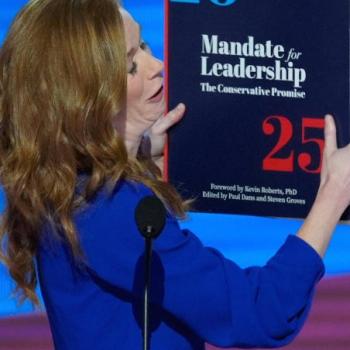Left Behind, pp. 241-247
Here we get a taste of the raw charisma of everyone's favorite rising Antichrist, a glimpse of the man who inspired the Carpathamania that's sweeping the world.
That, at least, is the task the authors have set for themselves in these pages, leading up to this conclusion:
… suddenly it was no wonder this man had risen so quickly in his own nation, no wonder the previous leader had stepped aside. No wonder New York had already embraced him.
After this, Buck knew, Nicolae Carpathia would be embraced by all of America. And then the world.
LaHaye and Jenkins, then, have set a trap for themselves. This chapter, like all their others, fails to convey what they intended, but this time the failure is not mainly due to their relentlessly awful writing. The failure is built in. There is no way they can possibly show us what they have told us we are going to see.
This happens even to good writers when their story includes, say, a character who is a world famous great poet.* At some point, readers are going to need to see some of that poetry for themselves and the writer is going to have to prove as gifted a poet as the character has been built up to be.
Some general lessons on avoiding this trap:
1. Don't write about great poets. Or about any other great artists whose skills readers will reasonably expect to see conveyed on the page (including oratory — see part 2). If you must write about great artists, stick with dancers, composers, painters or sculptors, but accept that you've created an enormous hurdle for anyone who wants to adapt your story for the screen.
2. If you're not writing a fairy tale, avoid superlative characters. Fairy tales have a different set of rules and expectations, allowing, or even requiring characters who can be described as "the fairest in all the land." If a character in your story is TFIATL — or the cleverest in all the land, or the smartest, or the funniest, or the greatest artist, or the most charismatic political leader (again, see part 2), or the bestest ever at whatever — then you should reconsider whether you might be, in fact, writing a fairy tale. If so, fine. You can then simply assert your superlative and readers will accept it. That's how fairy tales work. But if you're not writing a fairy tale, then readers will expect you to show us that the prince is, in fact, charming. You're going to have to back up your superlative assertions with an actual, superlative display. You've set the bar impossibly high for your character, but you're the one who's going to have to jump over it.
3. Be very careful about big scenes in which your preternaturally talented character wins over the crowd with an awe-inspiring display of his/her art/skill/cleverness/humor/charm. Such scenes are less likely to inspire awe than they are to result in anticlimax, with readers losing respect for you, your character and your character's audience, in that order.
All of which is to say that this chapter was almost structured to fail for LaHaye and Jenkins. Carpathia is their Antichrist, so he's by definition, superlatively superlative. And this is his Big Scene in which he demonstrates and displays all of the characteristics we've been told about him up until now. Set up this way, the scene was bound to fall flat, even if it had been in the hands of good writers.
But this chapter wasn't in the hands of good writers. It was in the hands of a careless hack guided by a heretical pedant. So for all of the inherent difficulties facing our authors here, they've still produced a chapter that sucks much harder than it needed to.
First we get a physical description:
He was a big man but not more than six feet five inches tall and not wider than a beer truck. His arms hung loose at his sides and a forgotten cigar smoked behind his enormous fingers. …
His skin was pale and he needed a shave. He would always need a shave. He had curly black hair and heavy eyebrows that almost met over his thick nose. His ears were small and neat for a man of that size and his eyes had a shine close to tears that gray eyes often seem to have. He stood like a statue, and after a long time he smiled.
Wait, sorry. That was Chandler's description of Moose Malloy in Farewell, My Lovely. My mistake. This is L&J's description of Nicolae Carpathia:
Carpathia appeared an inch or two over six feet tall, broad shouldered, thick chested, trim, athletic, tanned and blond.
So he looks like about 90 percent of the "no photo available" guys on Match.com.
His thick shock of hair was trimmed neatly around the ears, sideburns and neck, and his navy-on-navy pinstripe suit and matching tie were exquisitely conservative. … His jewelry was understated. His jaw and nose were Roman and strong, his piercing blue eyes set deep under thick brows.
Decide for yourself whether or not that sounds like a young Robert Redford. (For some reason all I could think of reading that was "I saw the Antichrist drinking a piña colada at Trader Vic's / His hair was perfect.")
What Buck Williams finds most impressive, however, is that Carpathia is going to give his speech without notes:
Buck was struck that Carpathia carried no notebook, and he assumed the man must have his speech notes in his breast pocket. Either that or they were being carried by an aide. Buck was wrong on both counts.
Buck's astonishment at this not-all-that-astonishing feat is all the stranger when you consider that L&J's target readership is mostly church people — people who attend Sunday morning and evening services, plus Sunday school, Wednesday night prayer meeting, Bible study, and all six nights of the annual Bible prophecy conference. They've seen hundreds of sermons delivered by scores of preachers. Some of those preachers may have read from a prepared text, and some may have used note cards or an outline, but it's not at all unusual or remarkable for a preacher to speak without using either of these. In fact, in the evangelical churches that make up L&J's core audience, that's how they usually do it, lest their prepared text or outline quench the spirit or prevent them from hearing the Lord's leading.
My guess is that this is how the Rev. Tim LaHaye preaches. I'm guessing that this is, for him, a point of pride reinforced by his Rayford-like failure to notice that it's not really exceptional, that this is how most of his colleagues preach too. And I'm guessing this is included here as a description of something amazing and impressive about Carpathia because LaHaye thinks this is something amazing and impressive about himself.
That's just a guess, mind you, but I can't see how else to make sense of Buck's being awestruck by this.
Secretary-General Mwangati Ngumo of Botswana announced that the assembly was privileged to hear briefly from the new president of the nation of Romania and that the formal introduction of their guest would be made by the Honorable Dr. Chaim Rosenzweig, with whom they were all familiar.
A bit disappointed that L&J weren't able to work an overly ethnic Asian name into that paragraph to go along with Mwangati Ngumo, Chaim Rosenzweig and Nicolae (…) Carpathia. (If you can't afford the correspondence courses offered by Jerry Jenkins' Christian Writers Guild, here's one of the things the master apparently teaches his students: To choose an ethnic-sounding name, just close your eyes and point your finger at a map. Mountain ranges and Zairean Congolese cities provide excellent character names.)
But before we get to Carpathia's speech itself, one other thing that's been bothering me about Rosenzweig.
We first met the good doctor in a flashback a year before the Event. Buck was interviewing him for Global Weekly's "Newsmaker of the Year" because his magic formula had turned every square inch of Israeli territory into a fruit-and-flower producing miracle, making that tiny nation the breadbasket of the world. It was like the Green Revolution on steroids. As the man who figured out how to feed a hungry world, Rosenzweig became a popular and beloved figure. Even now, post-Event, as he rises to introduce Carpathia at the U.N., L&J tell us he receives an "enthusiastic response."
This global embrace of Rosenzweig and his miracle fertility potion seems based on the idea that the problem of hunger was primarily one of scarcity. But post-Event, scarcity just ain't what it used to be. Demand for resources was just instantly reduced by a third, so a magic formula that doubles crop yields probably wouldn't seem as impressive or urgently needed.
The miracle fertility potion that people would be desperate for, post-Event, would have less to do with soil and more to do with the future of the human race. You would think that Rosenzweig would have been drafted to serve on some Global Emergency Blue Ribbon Panel of Nobel laureates, working without sleep or pause until they had answers to questions like: What happened to all our children? Will we be able to have more? Could this happen again? Etc.
But no one gathered at the U.N. seems to be giving any thought to such questions. The only question any of these people seem to have is "Gee, who is that charismatic young man with the Roman nose, piercing blue eyes and understated jewelry?"
– – – – – – – – – – – –
* Couldn't find the link, but John Rogers of Kung Fu Monkey had some very perceptive things to say about this very problem on NBC's Studio 60 on the Sunset Strip. Aaron Sorkin is a very talented, and often very funny, writer and Matthew Perry is a very funny, and often very talented, actor, but by creating a situation in which Perry's character is asserted to be the Funniest Comedy Writer in All the Land, Sorkin has painted them both into a corner.
















